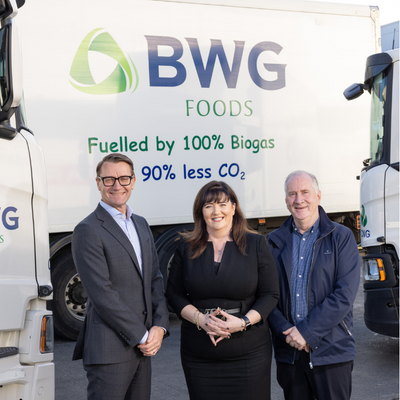
BWG Foods, one of Ireland’s leading wholesale and retail groups, today announced a significant €2 million expansion to its increasingly low carbon delivery fleet through the addition of 10 new bio-methane powered HGVs (Heavy Good Vehicles), adding to its existing fleet of two biogas trucks, which were originally launched in 2020 as part of a pioneering company programme to test innovative low carbon technologies across the business’ distribution operations.
The success of that trial programme resulted in BWG Foods, owners and operators of the SPAR, EUROSPAR, LONDIS, MACE and XL brands, taking delivery of 10 new biogas HGV trucks this week which will be on the road before the end of the year with plans already in place to add additional low carbon vehicles in the near future as the group pushes to significantly reduce carbon emissions across its distribution operation.
The new HGV trucks are fuelled with bio-methane in place of traditional diesel fuel with the biogas being produced through the natural breakdown of food and sewage waste. BWG Foods contributes non-consumable food waste from its distribution operations, including its 240,000 sq. ft. National Distribution Centre in Dublin, to produce biogas fuel for its new biogas vehicles at Generation Green’s biogas production site at Nurney in Kildare, making this a circular solution that is unique in Ireland.
The new bio-fuelled rigid 26 tonne fuelled trucks with electric fridge units each cost more than €180,000 and mark an expansion of an existing partnership between BWG Foods and Generation Green, representing the most significant development in terms of green transport in Ireland to-date. This initiative is supported by Gas Networks Ireland through the provision of linked infrastructure.
Speaking about the launch of the fleet, Simon Marriott, Chief Operations Officer, BWG Foods said, “We’re on a clear mission to significantly reduce the carbon intensity of BWG’s distribution operation, which is one of the very largest in the country, distributing over 25 million outbound cases per year. We very much see biogas as being a key solution for reducing transport related emissions, in conjunction with electric vehicles as technology develops for larger vehicles, and we are committed to investing significantly in continuing to grow our environmentally friendly distribution fleet over the coming years.”
Biogas has been designated as one of the Future Fuels of Choice by the Irish Government with greater investment and incentives planned to facilitate increased production of biogas in Ireland. BWG Foods have also earmarked biogas as its fuel of choice for the future as part of its own sustainable transition.
Commenting, Billy Costello of Generation Green said, “We’re delighted to be working with BWG Foods on this initiative and look forward to serving their biogas fuel needs into the future.”
The average BWG delivery truck covers 100,000 kilometres per year, meaning that the 90 percent reduction in transport related carbon emissions achieved through switching to biogas vehicles will save approximately 70 tonnes of carbon emission per vehicle per year, equating to 840 tonnes per annum when accounting for the full fleet of 12 bio-fuelled trucks. If taking the alternative carbon capture route, BWG Foods would have to plant approximately 46,000 trees to achieve the same environmental impact.
BWG also operates 18 CNG (Compressed Natural Gas) powered trucks with the ambition to migrate these to full biogas as soon as supply is available. CNG trucks deliver 20% CO2 savings against conventional diesel power trucks and are biogas enabled.
Last year, BWG Foods also invested in a new Fronius battery charging system for its extensive mechanical handling equipment (forklifts, pallet trucks, etc.) fleet that reduced electrical output, thus reducing carbon emissions by 170 tonnes per annum. It also invested €500,000 in a new fleet of energy efficient mechanical handling technology.
BWG Foods’ award-winning logistics division is amongst the largest in the country, supplying over 1,000 stores nationwide which together serve over one million people per day, along with a further 14,000 additional business customers across the retail, foodservice and licensed sectors. The Group is a participant in the Freight Transport Association’s “Trucksafe” programme which audits, reviews and documents fuel efficiencies within the commercial sector, providing data that identifies fuel reduction opportunities and tracks results.
